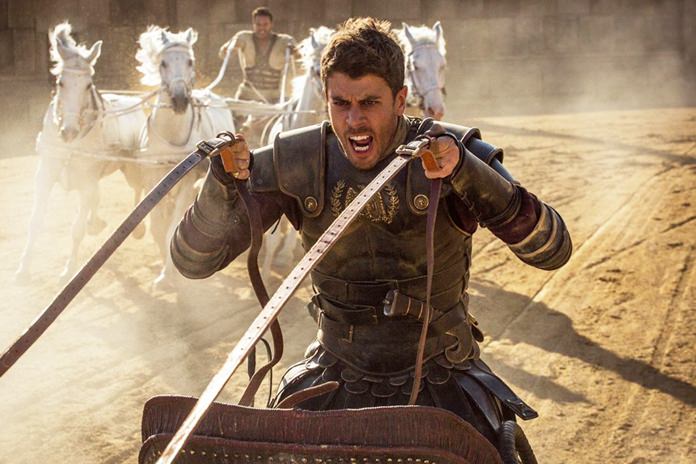Los Angeles (AP) – Remaking a film that won 11 Academy Awards invites inevitable comparison, but the latest adaptation of “Ben-Hur” distinguishes itself from William Wyler’s 1959 epic by retooling key character and story elements. It’s still a big, biblical-era tale of power, loyalty and vengeance, only refocused through rose-colored lenses with an eye toward appealing to the lucrative faith-based audience.

Produced by the power couple behind “The Bible” miniseries, Mark Burnett and Roma Downey, this “Ben Hur” is like an abbreviated, more Christ-centered take on Wyler’s film. It boasts similar sweeping desert landscapes, well-dressed Roman armies and heart-pounding equestrian action. Some shots pay clear homage to the Oscar-winning classic. The violence here is far more graphic, thanks to modern special effects (and sensibilities). This film is also an hour and 40 minutes shorter than Wyler’s epic (thank goodness).
But where Wyler’s version is ultimately about family and unrequited romance, director Timur Bekmambetov is more interested in redemption and the words of Jesus Christ. Jesus was silent and his face unseen in Wyler’s film. Played handsomely by Rodrigo Santoro, Jesus has a lot to say here.
Screenwriters Keith Clarke and Oscar winner John Ridley (“12 Years a Slave”) start with the premise and characters from the original 1880 novel. Judah Ben-Hur (Jack Huston) and Messala (Toby Kebbell) are like brothers until Messala becomes a Roman officer who falsely accuses Judah of betrayal. Messala condemns Judah to slavery and jails his innocent mother and sister. After years of captivity and an unlikely escape, Judah befriends a horseman who insists he exact vengeance against Messala during the celebrated Roman chariot race.
The action of that horse race is just as thrilling and exquisitely choreographed as any present-day movie car chase. It’s as intense as Wyler’s, though more visceral. Advances in filmmaking and animal training mean the falls are more dramatic and the injuries more gruesome and vivid.
The sprawling sets of Roman amphitheaters and hillside villages are as sumptuous here as in Wyler’s film, but somehow less magnificent. In the age of the “Hunger Games” and ever-present CGI, massive scale just doesn’t have the impact it once did.
Beyond that basic framework, the writers have taken many creative liberties with the source material. There’s no yearning romance between Judah and Esther (Nazanin Boniadi) as in the original story — or even between Judah and Messala, as in the 1959 film. Judah and Esther are married early in the first act of this “Ben-Hur,” and there’s none of the homoerotic hinting Charlton Heston’s Judah and Steven Boyd’s Messala shared in Wyler’s film. Here, the men’s brotherly bond trumps romance.
The role of Sheik Ilderim, which won Hugh Griffith a supporting actor Oscar, was expanded here for Morgan Freeman. Unfortunately, the character’s humor was removed in the process. A welcome addition to any cast, Freeman is out of place in this flatly drawn part, and not just because he’s the only one who doesn’t use a British accent. Why do characters in biblical dramas speak with British accents, anyway?
Speaking of creative liberties, Messala follows an unexpected trajectory here that exists neither in the original novel or Wyler adaptation. To say more would be a spoiler.
The music that plays such a significant role as to be a character itself (and an Academy Award winner) in Wyler’s “Ben-Hur” fades into the background here, save for Andra Day’s original song “The Only Way Out,” which plays over the closing credits.
This film bests other recent biblical dramas with more inclusive casting. Besides Freeman, there are several other actors of color, though Judah and Messala are both played by white Britons. Ridley Scott’s 2014 biblical epic “Exodus: Gods and Kings,” which similarly pits brother against brother, was widely criticized for its overwhelmingly white cast.
The message here, though, is a good and timely one, coming straight from Jesus: Lay down your arms and love your enemy.
“Ben-Hur,” a Paramount Pictures release, is rated PG-13 by the Motion Picture Association of America for “sequences of violence and disturbing images.” Running time: 124 minutes. Two stars out of four.




